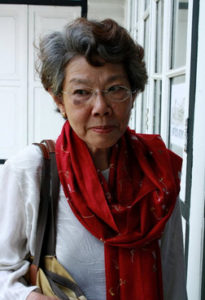 A novel “Echoes of Silence” (A) and its sequel “Days of Change” (B), are a good overview of Malaysia’s post-war colonial years until the end of the century. Chuah Guat Eng, who wrote this novel at the age of fifty, after a professional life in marketing and communication, chose a Chinese narrator Lim Ai Lian and then her favourite character, Hafiz, a Malay.
A novel “Echoes of Silence” (A) and its sequel “Days of Change” (B), are a good overview of Malaysia’s post-war colonial years until the end of the century. Chuah Guat Eng, who wrote this novel at the age of fifty, after a professional life in marketing and communication, chose a Chinese narrator Lim Ai Lian and then her favourite character, Hafiz, a Malay.
– An unconventional literary life:
Chuah Guat Eng was born in 1943 in Rembau, a small town in Negri Sembilan province, to a father, a civil servant and a teacher mother who died when she was only three years old. A family, educated in English, settled in the region probably several centuries ago.
But they are not “Babas” from Malacca; part of the family is from Burma and Thailand. Her father spent his youth in a rubber plantation. He lived quite like a young Malay even though he could not marry a girl from his village by refusing to convert to Islam.
Educated in English but unable to feel comfortable in a completely different cultural or racial mould: “my roots are like the roots of the Banyan tree, they grew from innumerable branches, trail down like vine and slowly thicken into a complex of pillars holding the even spreading tree” (C). This is also why much of the novel takes place in Ulu Banir in northern Perak province (ulu being the source and banishing the roots of the banyan; a symbol of the multi-ethnic origin and nature of the Malaysian nation).
At 50, she liquidated part of her pension fund and wrote “Echoes of Silence” which she published herself because the publishers were not interested in this English language literature.
She writes the sequel “Days of Change” with difficulty; it is the story of Hafiz, a Malay Muslim, linked to the Templeton family’s colonial plantation. The book was published in 2010 after a collection of short stories called “The Old House”, which I have not yet been able to read; a second collection called “Dream Stuff” was published in 2014.
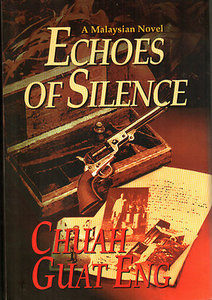 In 2008, she obtained a PhD and wrote a doctoral thesis for Universiti Kebangsaan Malaysia (UKM) and did her postdoctoral research at Universiti Putra Malaysia (UPM). She is also well known for two series of articles in The Star on English-language literature in Malaysia (which is not considered national literature).
In 2008, she obtained a PhD and wrote a doctoral thesis for Universiti Kebangsaan Malaysia (UKM) and did her postdoctoral research at Universiti Putra Malaysia (UPM). She is also well known for two series of articles in The Star on English-language literature in Malaysia (which is not considered national literature).
– A detective novel?
A great reader of detective novels, she wanted to use this literary genre but with questions: each genre has its own set of values and, in this case, European and Christian values. Is it then possible to write a novel in Malaysia using these literary forms in a country divided between different ethnic communities: who can kill who, who can be the despicable character… Referring to the colonial period poses fewer political problems!
But later, we cannot avoid talking about the racial riots of May 1969. Ai Lian then left Malaysia to pursue studies in Germany, in Munich; “emotionally unable to take sides, we came face to face with the misfortune of being Chinese without feeling particularly Chinese in what suddenly appeared to be an anti-Chinese world” (A p.25).
It is not a political book even if essential questions are raised. The New Economic Policy (NEP) is mentioned but is not at the centre of the book. For sure, Jonathan gradually sold his shares of the plantation to Yusuf, his former driver, Hafiz’s father, but this was a development that started before the NEP.
Corruption is often mentioned, particularly around Abu Bakar, a former school friend of Hafiz’s, who has become a real estate tycoon and wants to buy the Templeton bungalow on Jock’s hill, by any means possible. You have to have the right contacts, the links with the ruling faction; the Chinese are strangely absent from this kind of practice!
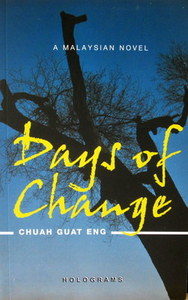 Chinese emigration to Australia and New Zealand has been a significant phenomenon. This is the case for Ai Lian’s mother, but as Jonathan, who became a Malaysian citizen, says, “forget the idea of emigrating because of Malay privileges. Once enough Chinese people emigrate to Australia, Canada, wherever, the same problem would arise there…why not live in a country which has already gone through all that nonsense” (A. p.305).
Chinese emigration to Australia and New Zealand has been a significant phenomenon. This is the case for Ai Lian’s mother, but as Jonathan, who became a Malaysian citizen, says, “forget the idea of emigrating because of Malay privileges. Once enough Chinese people emigrate to Australia, Canada, wherever, the same problem would arise there…why not live in a country which has already gone through all that nonsense” (A. p.305).
– The plot of a detective novel:
A complex story that unfolds slowly and in a subtle way on both books and revolves around the murder of Cynthia, a beautiful blonde, who was to be married to Hafiz and who eventually became Jonathan Templeton’s wife.
The core of the books are the characters and the plantation of Ulu Banir. A plantation created by Jonathan’s uncle, Michael’s father. Little is said about the lives of the Malay and Tamil people on the plantation, but there is no criticism of the colonial system. The leaders cared about their staff and during the Japanese invasion, they would pay salaries and debts, liquidate the plantation. Mary, a half-breed woman carrying Jonathan’s child, a refugee in Singapore, is married to Yusuf, the driver, to protect her from the Japanese.
Racial prejudice remains essential; Hafiz cannot help but wonder if he had been Jonathan’s son, “I would be like Mike, a European fair skinned…wealthy, going to school to England, treated with deference wherever I went…I would walk through life fearlessly, as one born and bred to lead, to make decisions, to manage, to rule the world” (B p.26).
In Malaysia, small villages, did not benefit from the NEP, but the novel evokes the dream village of Kampong Basoh with its idyllic aspect but also its tensions.
Sometimes it is difficult to evaluate the characters and understand them because the different protagonists often have contradictory opinions; this is the case for Cynthia. Some events bring questions: Mike wants to marry Ai Lian but can’t convince her and leaves without further delay for England. The same goes for those men who with virtue marry women pregnant by another man….
But most often these are characters who retain our interest; the analysis is precise, very detailed; human relationships that will be remembered.
– A Malaysian plot:
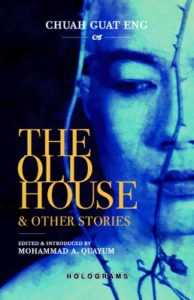 NEP and corruption issues have already been mentioned with the Abu Bakar character. The novel also tells us about Hafiz’s real estate development activities, the role of his wife, Rubiah, and her group of lawyers. We are in Malaysia at the end of the century and not only with colonial plantations.
NEP and corruption issues have already been mentioned with the Abu Bakar character. The novel also tells us about Hafiz’s real estate development activities, the role of his wife, Rubiah, and her group of lawyers. We are in Malaysia at the end of the century and not only with colonial plantations.
Hafiz is the main character of “Days of Change”, a complex individual of interest to the author. He is worthy of respect even if he hesitates at length about the decisions to be taken and in particular about the research foundation he wants to create.
His relationships with women are sometimes surprising; we are told about his relations with Cynthia but almost nothing about his ten years of marriage with Zinat, a union without children that ends with a divorce. The difficulties of his marriage with Rubiah are not always very clear, as is the absence of a new relationships with Mohini, his first love. His friendship with Mike seems more decisive than these links with different women.
– Ah Lian, spokeswoman for the novelist?
She vigorously denies: “Ah Lian character grew out of my need to understand the motivation of English-educated, non-Malay (specifically Chinese) Malaysians who chose to emigrate after the 1969 riots but who returned during the late 1980’s …when the Malaysian economy was doing well and there were opportunities for them to make money…Yet at the same time some of them had been and continued to be extremely critical of the country…opportunistic and cynical”(D).
Ai Lian is the daughter of Mary’s brother Hoods and will continue her studies in Munich where she meets Michael, the man of her life. They return to Ulu Banir and she will receive from 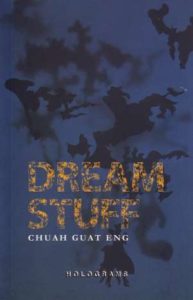 Michael the diamond necklace that belonged to Cynthia without Michael telling her who was the murderer. Their separation led her to marry Jonathan to give Anna, Michael’s daughter, a father. She will later earn a lot of money by trading in currencies, “I saw money as energy” (A p.293).
Michael the diamond necklace that belonged to Cynthia without Michael telling her who was the murderer. Their separation led her to marry Jonathan to give Anna, Michael’s daughter, a father. She will later earn a lot of money by trading in currencies, “I saw money as energy” (A p.293).
Very discreet on the Chinese environment, she gives us many comments on the Malays: “In general, the Malays are held back by their easy-going culture, their low expectations, their inability to postpone gratifications” (B p.258).
The novelist is very moderate in her judgments on the promotion of Malays and their language, but she does not accept the ideology of a nation centred solely on the Malays and defends the Chinese approach in cases where success is often explained in Malaysia by the absence of moral principles. This is why “Days of Change” revolves around the I Ching epigraphs that illustrate the chapters and days of the novel but above all the moral principles of the Chinese approach.
Bertrand Mialaret
(A) Chuah Guat Eng, “Echoes of silence”; Hologram 1994, 340 pages.
(B) Chuah Guat Eng, “Days of Change”; Hologram 2010, 270 pages.
(C) Chuah Guat Eng, “Thoughts from a disappearing island” in http://goodbooksguide.blogspot.com/2008/10/essay-thoughts-from-disappearing-island.html
(D) Interview by Wai Chiew Sim, Kritika Cultura n°23 p. 38-46. http://kritikakultura.ateneo.net





